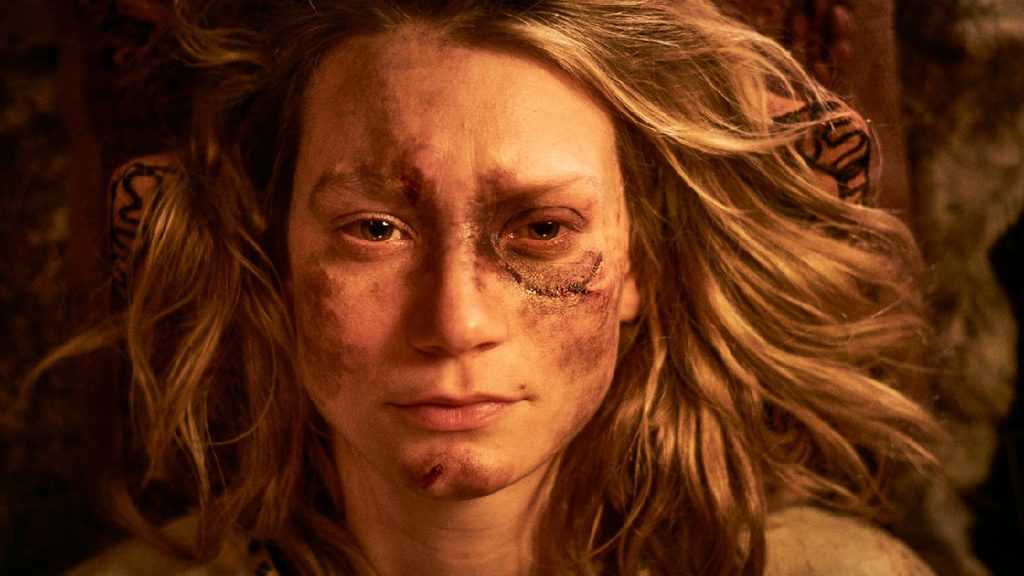Judy & Punch is a reimagining of the origin story of the famous puppet show. Drawing humour from the beating of puppet-Judy, the puppet show is old and dated, but director Mirrah Foulkes finds ways to make the tale modern and appropriate for the MeToo era.
The film begins with the titular Judy and Punch performing their acclaimed puppet show. Punch is hailed as the most talented puppeteer in all the world, but it’s clear that Judy does a lot of the heavy lifting and has a way with the audience. Punch is a man, who drinks too much, but ultimately seems to love his wife very much, attempting to stay on the sober path. After a tragedy strikes them, Judy ends up beaten to near death and Punch covering his tracks and things only get worse from there.
“Foulke’s film shines in its attention to detail.”
Judy & Punch turns out to be a feminist fairy-tale that constantly juggles different moods and tones, never settling for one thing, always reinventing itself and its mood. It’s not quite as effortless as one would hope, but it’s an interesting mix of humour and gleeful violence. Judy teams up with a group of heretics, most of them women or people with different deformities.
Foulke’s film shines in its attention to detail; near the end, a man missing his forearm is seen in the frame with the rest of the townspeople. Later, a woman without a leg is seen in the midst of the heretics, banished from the village, unfit and clearly a witch for her deformity. It’s a tiny detailed and it’s a much appreciated observation about the inequality still facing women.
Judy & Punch never shies away from the violence, especially against women. And why should it? A scene where three women are stoned to death is a hard watch, as it should, but it draws parallels to how women are still treated in society. We are held to a different standard and held accountable for things out of our hands. Judy’s empowerment comes from asking for equality and finding the strength to stand up not just for herself, but for her companions.
“The film has a soundtrack to die for, including a lot of trendy synth-pop and covers of popular songs.”
Mia Wasikowska and Damon Herriman are both utterly compelling as the titular characters. Wasikowska plays Judy tough, but with soft edges. She isn’t a warrior by choice, but a woman driven by revenge and justice for herself. Herriman is magnetic and appropriately sleazy as Punch, who is a much more complex character than one would expect in a revenge film. It’s these tiny nuances that lift Judy & Punch from average to a good, at times even a great film.
The film is filled with humour but it always goes hand in hand with misery and often violence. There is a particularly strange gag in the beginning of the film, at once giggle-inducing but also horrifying once it hits you. It’s a delicate balance Foulkes strives for here and the film often stumbles, trying to find the right recipe for a remarkable, meaningful film. The film plays like a rape-revenge film at heart. Although no rape happens, Judy and her body are nevertheless violated in horrible ways and for those ways, Punch must pay. Foulkes’ pacing is a bit erratic and the film proves overlong, but the sheer ambition is admirable.
The film has a soundtrack to die for, including a lot of trendy synth-pop and covers of popular songs. It’s a little on the nose, but so is everything in Judy & Punch. Stefan Duscio’s cinematography is beautiful, getting the most out of the fall colour palate the film utilises. Josephine Ford’s dedicated and detailed production design is one of the film’s biggest strengths. All the rooms and sets have a lived-in feeling and the heretics camp feels like a world of its own, especially the good doctor’s (literally called Dr. Goodtime and played deliciously by Gillian Jones) tent is a place of dark magic, curiosity and wonder.
“It’s a film that wants to set itself apart from the crowd, be the odd one out.”
The film’s gender politics are clear and straightforward. They’re a bit heavy-handed, but maybe that’s exactly what we need in times like these. The ending is cathartic, poignant and gloriously violent, but never cruel. It’s a film that wants to set itself apart from the crowd, be the odd one out. It’s loud, brash and engaging, like Robin Hood on ecstasy.
Foulkes is a talent to watch out for and while Judy & Punch has much to fault, mainly due to its unbalanced tone and pacing, it’s a fascinating feature debut from the actress-turned-director. Foulkes proves herself to be an actor’s director, drawing out great performances from her talent, but also cements her own vision front and centre of her film.
It may not be perfect, but Judy & Punch is certainly worth a watch and asks us all to handle babies very carefully. Or else.

